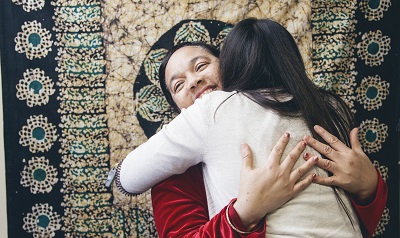The Pro Bono Council (PBC) brings together young professionals who are committed to supporting the work of Sanctuary, and the Legal Center in particular.
Sanctuary for Families’ Pro Bono Council is excited to announce its two new co-chairs— Ben Schatz of the Center for Appellate Litigation and Mia White of Freshfields Bruckhaus Deringer (Freshfields).
The Pro Bono Council (PBC) was formed in 2003 with the goal of bringing together young professionals who are committed to supporting and promoting the work of Sanctuary, and the Legal Center in particular. The PBC currently has approximately 35 active members, a network of approximately 150 professionals, and five subcommittees focusing on LGBT initiatives, membership, special projects, the annual Above & Beyond benefit, and technology.
Ben and Mia officially took over at the beginning of 2016 and have been meeting with Sanctuary leadership and brainstorming projects for the upcoming year. On February 10, 2016, they hosted their first meeting as PBC co-chairs.
Ben and Mia are dedicated public interest advocates and Sanctuary supporters. Ben started doing pro bono work with Sanctuary for Families while an associate at Cahill Gordon & Rendel LLP. He was inspired to partner with Sanctuary after Stacey Zyzyck, a former Cahill Gordon colleague, gave an amazing presentation about the pro bono work she was doing with Sanctuary. Ben took on several pro bono cases, became Cahill Gordon’s pro bono liaison for Sanctuary, and received a 2015 Sanctuary for Families’ Above & Beyond Pro Bono Achievement award.
For Ben, the best part about being a member of the PBC is the opportunity it provides to contribute to the incredible work of Sanctuary’s committed advocates, and to the success of its deserving clients.
Mia first learned about Sanctuary during a Courtroom Advocates Project (CAP) presentation as a student at Columbia Law School, and was introduced to the PBC by a fellow Columbia Law graduate, Shira Kaufman, who has since joined Sanctuary as a Staff Attorney. Prior to beginning her successful legal career, Mia worked at a non-profit organization called Ozone House as a Community Education Director.
Mia is passionate about the PBC because it brings together Sanctuary’s dynamic and energized supporters and channels their excitement for social justice into meaningful engagement with Sanctuary and their communities.
As co-chairs, Ben and Mia want to focus on empowering every member of the PBC with the knowledge and resources to serve as ambassadors for Sanctuary. In particular, they are creating an online presence for the PBC, inviting pro bono attorneys and volunteers to share success stories at PBC meetings, and leveraging members’ professional networks to enhance new initiatives through the special projects subcommittee.
Get Involved
The PBC welcomes all professionals committed to helping victims of gender-based violence who are interested in supporting and promoting the work of Sanctuary. The PBC hosts full membership meetings every other month at Freshfields Bruckhaus Deringer LLP at 7:00 PM.
Anyone interested in getting involved with Sanctuary and its pro bono work should attend a meeting to see this dynamic group of professionals in action – and to get involved themselves!
Please contact PBC co-chairs Ben Schatz (ben.a.schatz@gmail.com) and Mia White (mia.marie.white@gmail.com) to learn more about joining the PBC.
Nicole Fidler is the Pro Bono Supervising Attorney at Sanctuary for Families. Learn more about our Pro Bono Program.

